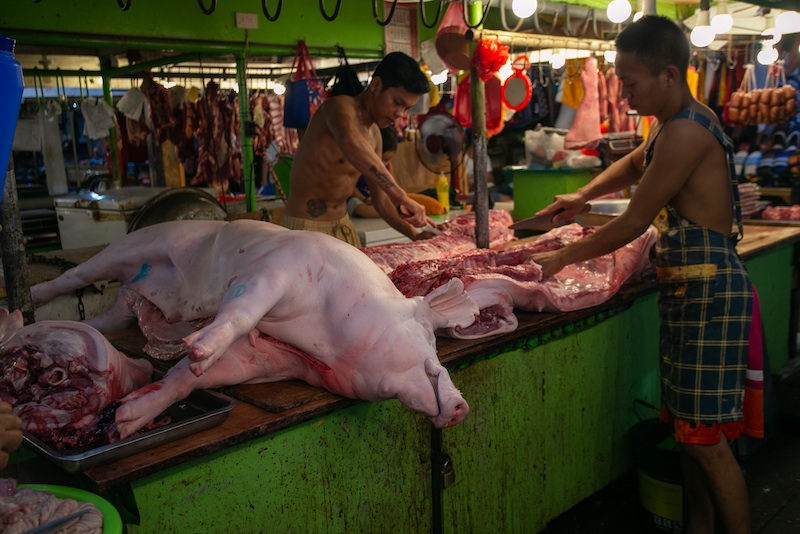DAVAO CITY (MindaNews / 14 February) – Davao Region has continued to import frozen pork products amid reports of an African Swine Fever (ASF) outbreak in commercial and backyard farms in two provinces and in this city, an official of the Department of Agriculture-Bureau of Animal Industry (DA-BAI) said on Friday.
Dr. Maria Teresa R. Bacayo, regional veterinary quarantine officer at the Veterinary Quarantine Services of the DA-BAI in Davao, said at the sidelines of the Kapihan sa Philippine Information Agency that pork imports came from countries free from the ASF.
Data from DA-BAI showed that frozen pork imports in the region totaled 287,774,859 kilograms as of October 2019.
 Meat vendors prepare pork cuts at the Agdao Public Market in Davao City on 3 February 2020. Davao City Mayor Sara Duterte has ordered a ban on the entry of pigs and pig products from Davao Occidental and Davao del Sur following the presence of African Swine Fever in Don Marcelino, Davao Occidental. MindaNews photo by MANMAN DEJETO
Meat vendors prepare pork cuts at the Agdao Public Market in Davao City on 3 February 2020. Davao City Mayor Sara Duterte has ordered a ban on the entry of pigs and pig products from Davao Occidental and Davao del Sur following the presence of African Swine Fever in Don Marcelino, Davao Occidental. MindaNews photo by MANMAN DEJETO
The biggest supply of imported frozen pork to Davao came from Spain, which accounted for 110,779,321 kilograms. Canada came in second with 35,240,100 kg, followed by France (34,752,913 kg), Germany (28,412,786 kg), US (27,635, 549 kg), Netherlands (19,462,944 kg), UK (8,901,134 kg), Denmark (5,852,000 kg), Brazil (5,228,949 kg), Ireland (4,696,376 kg), Australia (4,589,561 kg), Italy (1,421,499 kg), and Austria (801,726 kg).
Bacayo said inspectors would ensure that exporters to Davao have permits before they are allowed entry.
She said quarantine officers would inspect even the processing facilities of exporters in their countries of origin to make sure meat products are safe for consumption.
“We do risk analysis there and check their animal health system to see if they follow certain protocols. That’s sort of an accreditation. If that process has been completed, then they can ship to our country,” she said.
She, however, said they expect the volume of imported frozen pork products to drop next month, following the ASF outbreak in Davao.
Dr. Cerelyn Pinili, officer-in-charge of the Davao City Veterinarian’s Office assured consumers that the pork products sold in markets here are “safe for consumption” amid fears caused by the ASF outbreak in two barangays of Calinan, this city.
She said the hogs being transported and slaughtered in accredited abattoirs are strictly inspected, and hog owners are required to show a “shipping permit and health certificate” declaring their pigs are not infected with the disease.
She said that before the hogs enter the abattoirs the local government requires “ante-mortem” and “post-mortem” examinations to determine if the pigs and the meats are contaminated with the disease.
Pinili advised consumers to check the sellers’ meat inspection certificates issued by her office that are usually displayed in meat stalls in public markets or meat sections of the groceries in malls.
She said the local government continues to closely monitor the ASF outbreak that resulted in the culling of 1,562 hogs in Barangay Lamanan and 477 others in Barangay Dominga, Calinan District as of Tuesday.
She urged hog producers to practice biosecurity measures, including restricting the entry of pigs into their farms, disinfecting their areas, and avoiding feeding their pigs with swill, which is possibly contaminated with ASF.
She said hog raisers must immediately report to authorities if they see pigs showing signs and symptoms of the infection, so that they can conduct blood sampling to determine if they test positive for ASF.
“If you notice in your neighborhood that hogs are becoming weak, call our office so we can get blood samples from the pigs. We can immediately take action, unlike if you hide situations like this. This needs participation from the farmers, consumers, let’s help each other,” she said.
The DA requires all pigs within the one-kilometer radius of areas that reported an outbreak to be culled in compliance with the “1-7-10” protocol to manage, contain, and control the spread of the ASF.
The protocol requires that all pigs within the one-kilometer radius of infected farms will be culled, limits animal movement within seven-kilometer radius, and obliges swine farms within a 10-kilometer radius to submit a mandatory report on the disease. (Antonio L. Colina IV/MindaNews)
